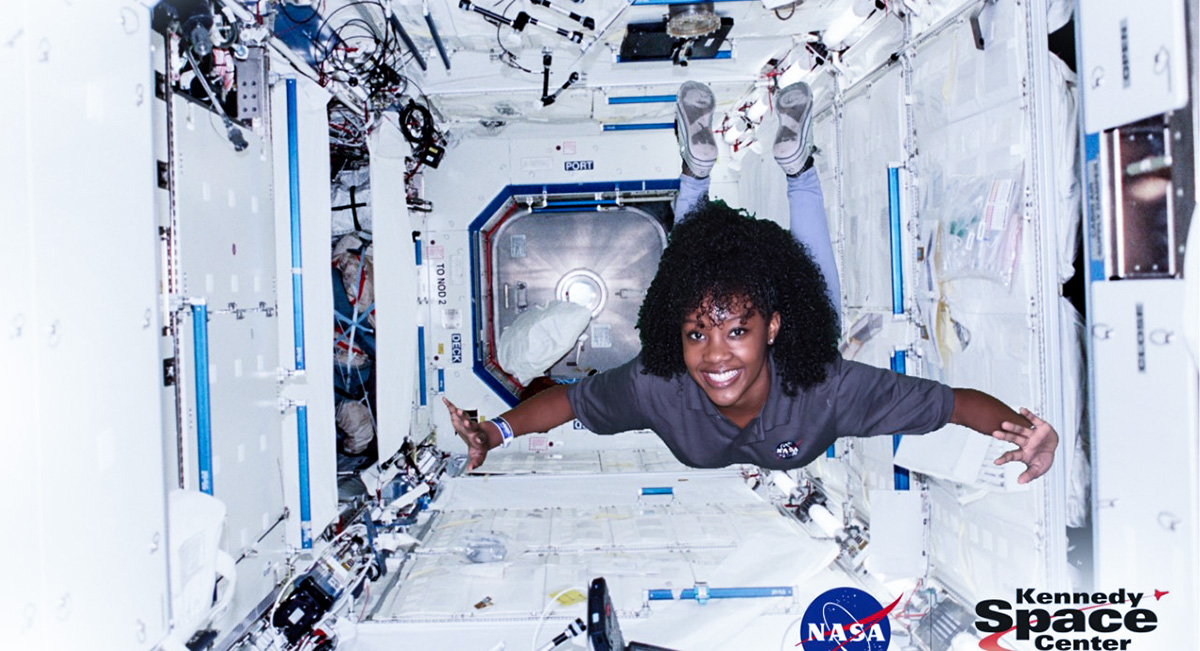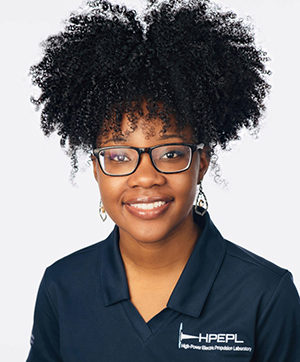
As a NASA Intern Naia Butler-Craig got to explore the Kennedy Space Center. Someday, she hopes to do the same in space.
 |
| Naia Butler-Craig |
When Forbes Magazine announced its 30-Under-30 cohort for 2020, Naia Butler-Craig, 23, was one of the youngest honorees on the list. Many who know her wondered, half-seriously, "What took Forbes so long?"
A doctoral student doing research in the Aerospace Engineering School's High Power Electric Propulsion Lab, Bulter-Craig has been a force to be reckoned with over the past 18 months. Quick to smile and scrupulously polite, she attacks her research with a laser-like focus. She makes no apologies for her obvious ambition, but, as we found out when we sat down with her, she thinks there's plenty of room for others to court their own dreams.
And she'd like to help them do just that.
How did you get here?
There are a bunch of factors, and many people. But I would say two things really paved the way. First, perseverance. As an undergraduate, I failed a really important class - Compressible Aerodynamics. My first reaction was, 'That's the end of me.' I mean it was literally the year when your GPA counts for graduate school, and I was applying. What I learned from this was to never count yourself out. Failure is part of the process. It took a lot of practice, but I literally had to visualize myself getting beyond it. The next semester, I was taking 18 credits, working remotely for NASA, working a job on campus, applying to grad school, and doing some other things outside of school, and I got an 'A' in that class, as well as earned the second-highest GPA of my undergraduate career, a 3.8.
Now that still didn't mean that I was guaranteed to get into grad school. I remember just after I failed that class, I was on an impromptu college visit to Georgia Tech, and I showed up to Dr. [Mitchell] Walker's door to ask him what kind of graduate students he was looking for and what I could do to qualify. The first thing he did was to ask me, 'What's up with that GPA?' I appreciated him going right for the most difficult question, because it gave us a chance to talk about it. He could see that there was more to me than that one class.
At the time, I did have experience in the electric propulsion field, a competitive internship, various research experiences, publications, conference presentations, and an extensive leadership background. And it made me feel at ease that this incredibly accomplished professor could understand that a GPA is not always a measure of what you've learned. That there was great value in not just having a high GPA, but in being a well-rounded student.
That kind of leads me to the other thing that's helped me: I have had mentors who have inspired and advocated for me all along the way. I don't know who nominated me for this honor, but it was part of my network, for sure. I have consciously established mentor relationships in several areas of my life: academics; career and professional pursuits; finances; personal development; and spiritual.
What are you doing now?
Right now, I am working in the High-Power Electric Propulsion Lab leading the construction and test of one of our cathodes. It is really exciting because there's a lot of physics to learn from these cathodes. Next semester, I will be leading a stand-alone cathode test.
How's that going?
Everything was going well until a component broke during assembly. While frustrating, I know that things not always going smoothly is part of research! So I was excited and felt confident troubleshooting this problem. Once that is taken care of, we'll be ready to start testing.
There's that word 'failure' again. How do you move beyond it?
I wouldn't be able to do what I do if I thought failure defined me. I think of failures as stepping stones to success. I have this diagram of success in my head - I got it from a book I read "Go For No". In it, they present two versions of success and failure. In one, there's success on one end of a spectrum and failure on the other; in between is you, trying to decide which way to go. That's not very helpful. It's so easy to make one wrong turn and end up as a failure. The other diagram has you on one end and success at the other; failure is in the middle. The message is: you have to go through failure if you want to get to success. That's the way I see it.
What is an aerospace engineer doing reading personal development books?
That book was recommended to me by one of my mentors who I sought out for professional and personal development.
Sounds like you have a team of mentors behind you. Where did you recruit them?
Networking has been the most important skill I've learned. That's how I meet the most amazing people -- at conferences, on LinkedIn, on Twitter, and even here at School. I learned this from one of my NASA mentors who told me that when you start networking, your contacts will begin to multiply on their own. This happens when you have contacts generous enough to introduce you to their networks. Even before I got my job at NASA, I had a mentor my freshman year of undergrad who told me I need to be seeking out internships. As a first-generation engineering college student, that was the furthest thing from my mind, and I had no clue where to start or how that worked. But he explained, to do that, I would have to get my resume together and attend conferences with career fairs, like NSBE (National Society of Black Engineers). I did exactly what he told me to do, and, really, that's how I ended up getting my first internship in my freshman year.
Do you see yourself as a mentor?
I do. I can definitely improve as a mentor, but it is something I find really important. I have a few back at Embry-Riddle who are moving and shaking in our industry and in the world. I’ve very proud and humbled that I could even play a small part in their development.
What sorts of advice do you give to your mentees?
Well, I have a forum on my website (naiabutlercraig.com) where people can ask me questions. The answers are all online, so it's really open to everyone. This way, when I don’t have the bandwidth to provide one-on-one guidance, people seeking out help have a breadth of resources at their convenience. I try to be as thorough as possible on my website, so a lot of the content appeals to first-generation, under-represented college students.
As a now, first-generation graduate student, there is still so much I’m learning about the nooks and crannies of academia. So I just try to share what I know as I learn. There is a general lack of informational resources available to under-represented students. For instance, one thing I have heard often is how people don't want to go further into debt to get a graduate degree in STEM. I hear it pretty often. But there's actually a lot of opportunities out there to fund STEM graduate degrees. If you want to get one, there's a way to fund it.
The other thing I tell them is to adopt the attitude of 'Don't count yourself out' when it comes to pursuing opportunities. Or, as my mother says, 'Why not me?'
A lot of students, including myself, have ‘imposter syndrome' or they've been discouraged by the comments they've heard from someone. My remedy to this is: apply even if you don't feel qualified. I'm a great example of displaying this attitude. I would not be in graduate school right now if I'd taken that failing grade as a sign that I wasn’t good enough.
In 15 years, when they announce a 40-Under-40, what will we be reading about Naia Butler-Craig?
I pray that I have a Ph.D. by then. [laughs] I don't think Dr. Walker would let me stay that long.
Seriously, though, I would say I want to be in a position where I can be a true contributor to the electric propulsion field. Making a true and indelible mark on this field is one of my more ambitious professional goals.
And by then, I would have applied to the astronaut program at least once...and hopefully have heard something positive. My goal is to become a mission specialist astronaut and participate and contribute to deep space exploration.